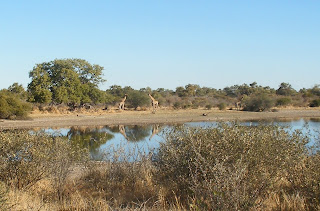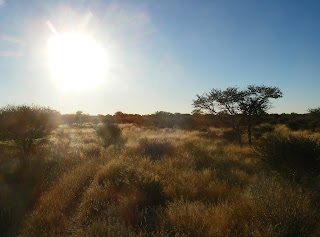"Don't ever get between a hippo and water. When they are upset, they charge towards water – no matter what is in their way."
No, this isn't a voice-over from a Discovery Channel documentary, nor a sentence in an Africa survival guide. This advice was received while gazing at a family of hippopotamuses while the sun set in the background, casting a hazy orange light onto the barely-showing hippo tors. We – my host friend, the teacher's aide, and I - were standing on the bank of a small pond, which would have almost dried up by now except for unexpected rainfall a week or two past. Surrounding us were scrubby plants on red sand and the occasional white limestone outcropping. The kudu on the opposite side of the pond camouflaged perfectly, their disguise aided by a blanket of soft golden rays from the setting sun.
This is Ghanzi – well, technically a farm owned by the same family for over 50 years lying about an hour outside of town. Accessible only by a small dirt road, interrupted rudely by many gates and the occasional cattle, the farm is half-cattle-post (5,000 head) and half-game-reserve. We arrived via a public bus, which cost P93 (about US$15) for the almost-eight hour drive from Gaborone to Ghanzi. We had made about 10 stops in total – some appearing to be in the middle of nowhere – and two "major" stops with toilets and food for sale. Although I'd eaten my fill from the lunch boxes we'd brought, I hadn't drank anything the entire day except a cup of tea in the early morning; I didn't want to find myself in the middle of the Kalahari and in need of a bathroom!
The Ghanzi bus station wasn't much – just a few people standing around speaking the Bushmen language (masarwa), a corrugated-metal restaurant with a woman cooking over a fire out back, and a dirt turnaround. But it sufficed. As we disembarked from the hot and stuffy bus, we were relieved – and excited – to see "grandpa", who has lived in Ghanzi for over fifty years, is 83, flies his own airplane, and loves chocolate (both giving and eating it), and who at this moment was driving into the station with a white pick-up truck with three seats elevated in the back – a true safari vehicle. We'd be riding in this rig to the farm, and then out for a game drive. The wind felt exhilarating and freeing as we drove down the road; since we were so high up, the bumpy ride didn't bother us one bit.
We arrived at the farmhouse, and after depositing our rather small overnight bags in our respective rooms, we once again boarded the game drive truck and embarked on a search-and-find mission unlike any I'd ever been on. I rushed out of the house excitedly, only to be stopped and told to go get my "jersey" (an all-encompassing word for sweatshirt, sweater, and hoodie). "And a jacket!" called my friend's aunt. I stood there, dumbfounded and sweaty. In this heat, I'd need a fleece jacket? I couldn't believe it – and said so. Laughing, I was reminded that we were in the desert. And once the sun went down, the temperature quickly dropped from hot to cold. Grudgingly, I obliged, and retrieved my sweater, fleece, and a pair of socks.
A few minutes after we set out, we reached a salt pan – a flat, scrub-less area – and my friend's uncle pointed out a variety of hoofed-and-otherwise animals: deer-like kudu and wildebeest dominated this verdant field. Ostrich ran gracefully across the grassland, their tail feathers bobbing while the rest of their bodies remained astonishingly still. We slowed down to take some photographs, and I remembered how I'd broken my camera's zoom while in Peru. As a result, most of my photographs turned out like the pages in a child's search-and-find book – but at least I could see in real life, and what we saw!
After this field, some huge, deer-like eland and beautiful gemsbok crossed the road in front of us.
"Are there giraffe here?" I asked, hopeful.
"Yeah, but you hardly ever see them," replied my friend, emphasizing their elusiveness. I silently wished that we'd get to see one or two.
We continued on our journey, accompanied by eagles, more kudu, and vultures. A game veterinarian and family friend visiting the farm told us some amazing facts about vultures, who receive unfairly poor press: they can fly tens of thousands of feet into the air, keeping oxygen in pockets in their bones and breasts, and taking advantage of their hemoglobin, far superior to that of humans; they are immaculately clean, and always bath and drink water after they eat; like humans, they wouldn't eat rotten meat (although how many humans always shower after a meal of meat?); and can fly hundreds of miles without flapping their wings because of their incredible ability to ride air currents.
As we passed a small pond with some marabou stork, an excited call came: "Giraffe!" Six tall, elegant, and astonishingly graceful creatures stood by a distant pond, looking straight at us, we who rudely interrupted their tree-top grazing. We stopped the truck and gazed upon these massive creatures, who stared back at us with lovely faces. As we pulled away, I spied the most lovely photograph opportunity: two giraffe stood on either side of a tree on the edge of the pond, with their reflections clearly visible on the still water beneath them. We stopped again, and took some more photographs, but mostly simply absorbed the beauty of these incredible animals in their natural element. Their orange and brown bodies blended in with the reddish-brown dirt and the russet bushes.
Eventually and reluctantly we drove on. After a while, we grew accustomed to the kudu, and even I became able to spy their heads and horns poking up from the undergrowth. For a moment we glimpsed a herd of zebra; then they ran off. Finally we arrived at the small but plush camp (lodge would be a more fitting word) where the "clients" stayed – mostly Americans who came to the farm to hunt. How anyone could kill the lovely creatures we had been quietly discovering I cannot understand, but the view from their camp was certainly lovely. A family of hippopotamus, almost completely submerged, lounged in the clear pond. An elegant papyrus tree framed the sunset. We soaked up the beauty of a desert sunset, and by the time we walked back to the truck we were eager to don our jerseys and hats for the ride back to the house.
After a nice dinner – including a desert of strawberries and thick cream - and some photographs, we each took baths and climbed into our warm beds, setting our alarms for four o'clock. We had to be at the bus station to catch the ride back to Gaborone at six o'clock sharp, and had to factor in the hour from the farm to the town part of Ghanzi.
My friend tells the story much better than I do, but our morning was…exciting. We left the house at about 4:45 in a four-by-four, and stopped while the vet friend evacuated to open a gate. He came back and knocked on my friend's grandpa's window. In our state of semi-sleep, we heard the news: flat tire. And we'd only gone about 20 meters! Luckily, the family friend was a talented mechanic as well as an animal expert, and quickly changed the tire. Running late, we dashed off – only to slow down because of the threat of kudu or cattle in the road. Crawling along the dirt road, we finally made our way into the bus station at 5:58. We quickly hugged our goodbyes, and rushed onto the not-yet-crowded bus.
We arrived back in Gaborone and went to my friend's house for a late lunch and showers - and to look at photographs. I'm having trouble posting them, but I will soon.

 Above: Eland, kudu, and wildebeest wander in a small salt pan (a flat, grassy field). Sorry about their reduction to little black dots...some things just look better in real life!
Above: Eland, kudu, and wildebeest wander in a small salt pan (a flat, grassy field). Sorry about their reduction to little black dots...some things just look better in real life! Above: Can you see the hippos?!
Above: Can you see the hippos?! Above: GIRAFFE! I ordered the truck to stop when I saw the beatiful reflections of the giraffes in the water.
Above: GIRAFFE! I ordered the truck to stop when I saw the beatiful reflections of the giraffes in the water.
